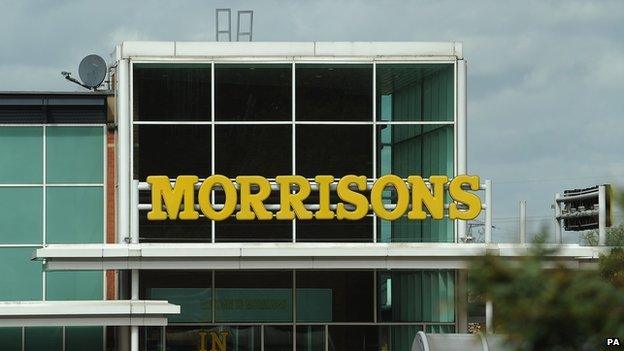Morrisons and the threat to mainstream supermarkets
- Published
- comments

Although the scale of what's gone wrong at Wm Morrison is unusual, its woes highlight challenges faced by all mainstream supermarket groups.
A couple stand out for me:
The challenge of the so-called hard discounters, Aldi and Lidl;
The impact of the migration of business online.
First it is worth noting just how far and fast Morrison has fallen. What it calls underlying profits was £901m two years ago. That fell to £785m last year, and it is forecast to be between £325m and £375 in the current year.
Or to put it another way, Morrison's profitability has crumbled almost two-thirds over three years.
Some of that is cyclical, the result of a squeeze on customers' living standards.
Much of it is secular, a permanent migration to cheaper rivals, and a shift in spending habits to local convenience stores and online shopping.
Only now is Morrison responding to what it sees as these permanent changes, by belatedly establishing convenience stores, forming a joint venture with Ocado in online shopping, and by what it calls a "reset" of "the profit base", in order to offer "best value, price and quality for customers".
In other words, it is reconciled to squeezing its profit margins, or to making less profit per customer, to try and fight back against the aggressive competition from Aldi and Lidl.
So, some of Morrison's woes are sui generis, a failure to make the right investments in IT and property over the past decade.
But some are relevant to all supermarkets.
Or, if Morrison is cutting profit margins in a significant way, won't its mainstream rivals Tesco, Sainsbury and Asda have to do something similar?
And another thing. Online is changing the economics of supermarkets in a fundamental way - and in a way that does not bode all that well for conventional stores.
The simple point is that the costs of selling from a store are relatively fixed, in the form of wages and rent, so additional sales from a store generate progressively bigger profits.
And the reverse is true. When sales fall in a store, profits will fall faster than those sales, because (to repeat) so many of the costs are set in stone.
So a big investment in online, of the sort that Morrison is doing, can undermine the profitability of stores in a fundamental way, by cannibalising sales.
Which would not matter if the intrinsic profitability of online was massively greater than for sales from stores.
But published results of Ocado don't exactly demonstrate that. And what's more, Morrison is sharing whatever profits it succeeds in generating online with Ocado.
All of which is to say (as if you didn't know) that there is something of a revolution going on in food retailing. And that revolution probably benefits us, shoppers, by delivering deflation in what we buy and more choice in how we buy.
But for the giant supermarket chains we traditionally regarded as fearsome and invincible, there's a threat which - if not quite existential - is pretty serious.